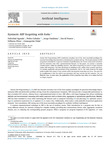Mostrar o rexistro simple do ítem
Syntactic ASP forgetting with forks
| dc.contributor.author | Aguado, Felicidad | |
| dc.contributor.author | Cabalar, Pedro | |
| dc.contributor.author | Fandiño, Jorge | |
| dc.contributor.author | Pearce, David | |
| dc.contributor.author | Pérez, Gilberto | |
| dc.contributor.author | Vidal, Concepción | |
| dc.date.accessioned | 2024-04-22T12:59:51Z | |
| dc.date.available | 2024-04-22T12:59:51Z | |
| dc.date.issued | 2024-01 | |
| dc.identifier.citation | F. Aguado, P. Cabalar, J. Fandiño, D. Pearce, G. Pérez, and C. Vidal, "Syntactic ASP forgetting with forks", Artificial Intelligence, Vol. 326, 104033, Jan. 2024, doi: 10.1016/j.artint.2023.104033 | es_ES |
| dc.identifier.uri | http://hdl.handle.net/2183/36290 | |
| dc.description.abstract | [Abstract]: Answer Set Programming (ASP) constitutes nowadays one of the most successful paradigms for practical Knowledge Representation and declarative problem solving. The formal analysis of ASP programs is essential for a rigorous treatment of specifications, the correct construction of solvers and the extension with other representational features. In this paper, we present a syntactic transformation, called the unfolding operator, that allows forgetting an atom in a logic program (under ASP semantics). The main advantage of unfolding is that, unlike other syntactic operators, it is always applicable and guarantees strong persistence, that is, the result preserves the same stable models with respect to any context where the forgotten atom does not occur. The price for its completeness is that the result is an expression that may contain the fork operator. Yet, we illustrate how, in some cases, the application of fork properties may allow us to reduce the fork to a logic program. | es_ES |
| dc.description.sponsorship | We want to thank the anonymous reviewers for their suggestions that helped to improve this paper. Partially funded by Regional Government of Galicia and the European Union, grants CITIC (ED431G 2019/01), GPC ED431B 2022/33, by the Spanish Ministry of Science and Innovation, Spain, MCIN/AEI/10.13039/501100011033 (grant PID2020-116201GB-I00), by BBVA Foundation, Scientific Research Grants, (project LIANDA), and by the National Science Foundation (NSF 95-3101-0060-402). | es_ES |
| dc.description.sponsorship | Xunta de Galicia; ED431G 2019/01 | es_ES |
| dc.description.sponsorship | Xunta de Galicia; ED431B 2022/33 | es_ES |
| dc.description.sponsorship | United States. National Science Foundation; 95-3101-0060-402 | es_ES |
| dc.language.iso | eng | es_ES |
| dc.publisher | Elsevier | es_ES |
| dc.relation | info:eu-repo/grantAgreement/AEI/Plan Estatal de Investigación Científica y Técnica y de Innovación 2017-2020/PID2020-116201GB-I00/ES/RAZONAMIENTO AUTOMATICO Y APRENDIZAJE CON INDUCCION DE CONOCIMIENTO/ | es_ES |
| dc.relation.uri | https://doi.org/10.1016/j.artint.2023.104033 | es_ES |
| dc.rights | Atribución 3.0 España | es_ES |
| dc.rights.uri | http://creativecommons.org/licenses/by/3.0/es/ | * |
| dc.subject | Answer set programming | es_ES |
| dc.subject | Equilibrium logic | es_ES |
| dc.subject | Forgetting; Forks | es_ES |
| dc.subject | Strong equivalence | es_ES |
| dc.subject | Strong persistence | es_ES |
| dc.title | Syntactic ASP forgetting with forks | es_ES |
| dc.type | info:eu-repo/semantics/article | es_ES |
| dc.rights.access | info:eu-repo/semantics/openAccess | es_ES |
| UDC.journalTitle | Artificial Intelligence | es_ES |
| UDC.volume | 326 | es_ES |
| UDC.startPage | 104033 | es_ES |
| dc.identifier.doi | 10.1016/j.artint.2023.104033 |
Ficheiros no ítem
Este ítem aparece na(s) seguinte(s) colección(s)
-
GI-IRlab-Artigos [27]






